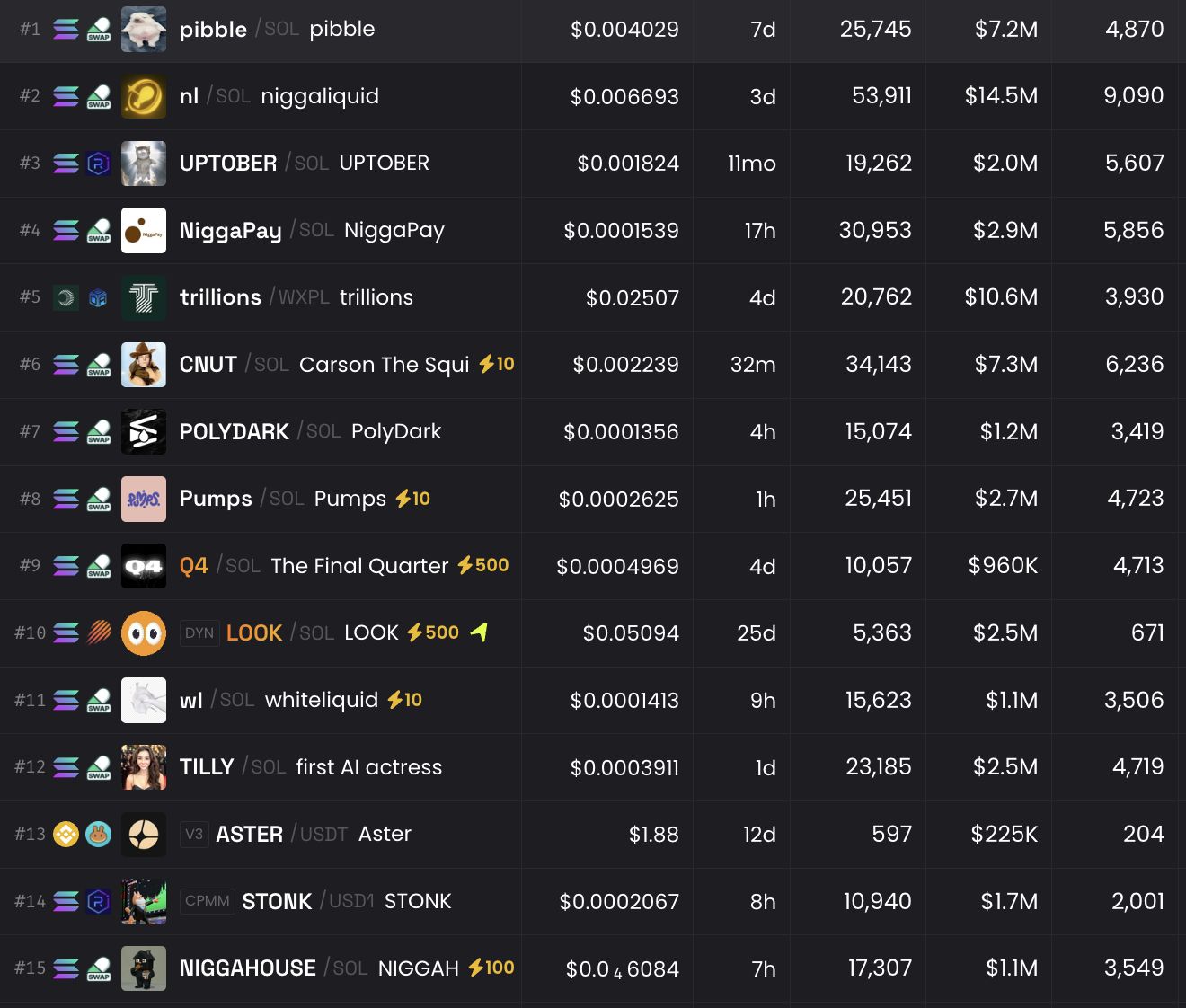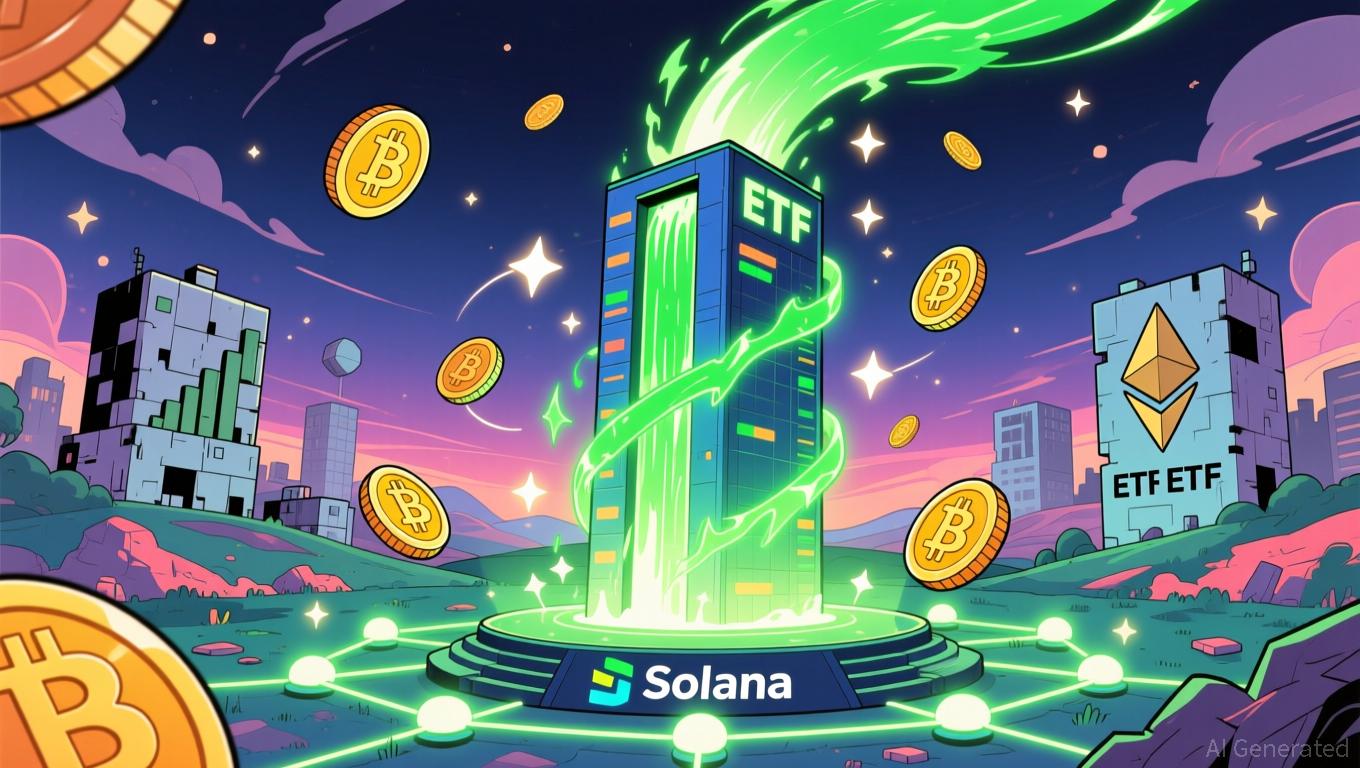Is Pump.fun Enabling a New Generation of Racists?
Pump.fun’s rapid coin-launch model has enabled racist tokens to trend on DEXs, spotlighting crypto’s struggle with regulation and ethics.
The emergence of multiple trending tokens launched via Pump.fun that contain racial slurs has generated widespread concern across the crypto community regarding the proliferation of discriminatory and highly offensive meme coins.
These incidents have restarted the debate over the lack of regulation in the meme coin space. The ease with which tokens can be created on launchpads inevitably facilitates the dissemination of malicious content.
Escalation of Offensive Meme Coins
A concerning trend emerging in the meme coin industry is the proliferation of racist tokens.
Of the top 15 trending tokens on DEXScreener, four have names that contain racial slurs or allude to skin color. The tokens were all launched on the popular Solana platform, Pump.fun.
 Pump.fun has come under scrutiny for the launch of racist meme coins. Source:
DEX Screener.
Pump.fun has come under scrutiny for the launch of racist meme coins. Source:
DEX Screener.
The news comes a day after Pump.fun enthusiasts reportedly vandalized the Hollywood sign in Los Angeles, hanging up a banner with the launchpad’s signature pill logo.
Crypto enthusiasts from Pumpfun vandalized the Hollywood sign.1) Whaat
— 0xMarioNawfal (@RoundtableSpace) September 28, 2025
While racist meme coins are not new to the crypto sector, their recent status as trending tokens on decentralized exchanges (DEXs) illustrates the escalating scale of the problem.
Ease of Creation and Malicious Content
Commonly described as a “meme coin factory,” Pump.fun is a decentralized platform that has transformed the creation of meme coins. The launchpad makes the process exceptionally simple, fast, and affordable.
This extreme ease of use has drastically lowered the barrier to entry for launching hateful or racist meme coins. The increased frequency of these offensive tokens represents the democratization of malicious content.
A prime example came earlier this year when an American rapper announced a “Swasticoin” on X.
In a separate incident, a “Hitler Musk” token swiftly appeared on Pump.fun immediately following Elon Musk’s salute during Donald Trump’s presidential inauguration. The gesture was widely interpreted as a reference to Nazi-fascism.
Despite some attempts by industry leaders to condemn the creation of these controversial tokens, the recent incidents clearly demonstrate that the issue remains persistent.
The Regulatory Challenge of DEXs
Leading figures in the cryptocurrency sector addressed the proliferation of meme coins with offensive themes.
Ethereum co-founder Vitalik Buterin previously criticized the rise of these tokens. In the March 2024 blog post, he specifically condemned “openly super-racist” meme coins on the Solana blockchain and other tokens linked to totalitarian regimes.
The Solana Foundation has also acknowledged the issue. Austin Federa, the foundation’s head of strategy, proposed that implementing filtering mechanisms within crypto applications could be a viable solution for restricting the visibility of these controversial assets.
Yet, curbing this activity on a DEX is inherently difficult because there is no central authority to vet or police token names before launch.
Consequently, a regulatory and ethical vacuum continues to enable the creation and viral spread of these controversial tokens.
Disclaimer: The content of this article solely reflects the author's opinion and does not represent the platform in any capacity. This article is not intended to serve as a reference for making investment decisions.
You may also like
Solana News Today: The Rise of Stablecoins Indicates Investors Are Favoring Stability Instead of Riskier Protocols
- USDC stablecoin surpassed Solana (SOL) in market cap, signaling a shift toward stablecoins over volatile protocols. - Solana Company reported $352.8M Q3 2025 net loss, driven by derivative liabilities and unrealized treasury losses. - USDC's growth stems from institutional partnerships, including Parfin and Orobit.ai, aligning with pro-crypto regulatory trends. - Coinbase's ETH-backed USDC loans and infrastructure expansion highlight stablecoin utility in bridging traditional and crypto finance. - Market

Solana News Today: Staking Drives Altcoin ETF Boom as Investors Look for Returns Outside of Bitcoin
- Solana ETFs attract $476M inflows since October 28, driven by staking rewards and lower fees compared to Bitcoin/Ethereum ETFs. - Bitwise's BSOL dominates with 89% of inflows, leveraging 0.20% fees and on-chain staking to generate returns for investors. - Despite ETF growth, Solana's price remains below key EMAs at $141, with analysts warning of potential support tests below $120. - Bitcoin/Ethereum ETFs face outflows as investors shift toward yield-generating altcoin products, signaling market strategy

Zcash Halving Scheduled for November 2025: How Supply Disruptions Are Influencing Institutional Crypto Investment Strategies
- Zcash's 2025 halving reduced block rewards by 50%, intensifying deflationary pressure and triggering a 750% price surge to $680. - Institutional investors like Cypherpunk and Grayscale allocated $287M to Zcash, citing its 3.5% inflation rate and privacy-focused proof-of-stake model. - Regulatory scrutiny labeled Zcash an "anonymity-enhancing asset," but optional privacy features and AI compliance tools help institutions navigate risks. - Market volatility and competition from newer privacy protocols pose
Zcash (ZEC) Price Rally: Is the Privacy-Focused Cryptocurrency Poised to Enter the Mainstream?
- Zcash (ZEC) surged 472% to $420, driven by institutional investments and regulatory clarity in 2025. - Grayscale and Cypherpunk Technologies allocated $137M and $150M to ZEC, citing its compliance-ready privacy model. - U.S. Clarity/Genius Acts enabled Zcash's selective transparency, bridging privacy with AML requirements for institutional adoption. - Regulatory risks like FinCEN's "mixer rule" and developer scrutiny persist, testing Zcash's balance between privacy and compliance. - Zcash's institutional
